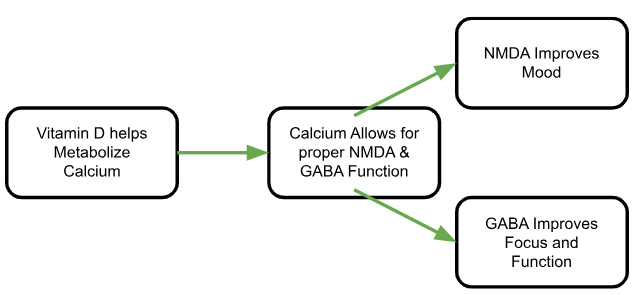Many people already know that a sunny day can make all the difference for our mood. The flip side of that is that multiple gloomy, gray, cloudy days can crush our sense of wellbeing. In fact, there’s even a clinical term for people who suffer from depression during dark months, Seasonal Affective Disorder (SAD). It affects millions across the UK and Europe, and as many as 5% of all Americans.
But what does that have to do with Vitamins and supplements? Well, it turns out SAD–and our mood and cognitive performance–may entirely depend on the amount of Vitamin D we’re getting from sunlight. In this article we’ll break out the big data, looking at the details of how Vitamin D supplements could help get your mood and mental game in peak shape.
What You Need to Know
How Vitamin D Works in Our Brains
Not all the effects of Vitamin D on our brain chemistry are direct. As we’ll see a bit later, Vitamin D plays a central role in our production and use of Serotonin, but it also helps with two factors that balance our mood and concentration–NMDA and GABA.
NMDA & GABA
To begin with, we have to understand that our moods and mental performance can largely be explained by natural levels of NMDA Receptors and GABA neurons. NMDA stands for N-methyl-D-aspartate, and it’s responsible for reacting to glutamate to “excite” the brain–make it faster, feel energized, and generate feelings like euphoria. GABA stands for Gamma-aminobutyric acid, and it’s responsible for the “slow down” mechanism of our brain, bringing about better focus and concentration.

Got that? Okay, we’re almost there. Research has proven out that for the pathways in our brain to effectively use NMDA and GABA, we need a lot of Calcium (Ca2+) in our brain cells. And for our brains to absorb, retain, and use Calcium, we need lots and lots of Vitamin D. While this relationship has been known for years for bone-health, which is why milk in some countries is fortified with Vitamin D, it’s only now becoming clear for brain and mood health.

Serotonin
In addition to NMDA and GABA, very new research has shown that there is a direct link between Vitamin D and Serotonin. It turns out that when we don’t have enough Vitamin D, our very genes have trouble expressing their enzyme response to produce Serotonin.
And Serotonin is a powerful indicator of mood and depression. In fact, Serotonin affects everything from our bone health to sexual desire, and can even influence how well we digest food. This mechanism is quite direct–when we don’t have enough Vitamin D, we don’t have enough Serotonin.
Now that we have the chemistry understood, we can have a better understanding of why sunshine can really turn our day around. And we can also dive into some case studies that show exactly how effective Vitamin D is at improving our Mood and Performance.
Clinical Studies and Trials
Right up front is a disclaimer that should be familiar to our regular readers:
If you have a diagnosed mental or emotional issue, consult your doctor before beginning, ending, or modifying any medication or supplement routine. We at the Great Green Wall only seek to educate, not make medical decisions for you.
That being said, in an effort to educate, and to stay dedicated to the data, we have some studies showing great promise with Vitamin D and depression and we have some studies showing no results whatever. So where’s the truth? Probably in the middle.
Successful Studies
First we have an observational study from just last year, in which two hundred people were observed, half with depression, half without. In the study, they directly linked Vitamin D deficiency with depression.
In another study, trying to find out if you could work the effect in reverse, over 400 people were included in a randomized, double-blind, placebo controlled study–and researchers determined that a Vitamin D supplement could reverse the signs of depression.
Lastly, we’ll point to a double-study, one that took a full 6 months, the other taking a year to conduct. In both analyses, higher exposure to sunlight and higher Vitamin D supplementation led to better wellbeing. For the next section, we need to keep that last part in mind–the amount of Vitamin D taken was important. Okay, on to the negative results studies.
Other Results
Our first study that showed no results of Vitamin D on depression is a murky one. It sounds impressive on the surface, but upon looking deeper we find a lot of flaws. In the first case, this study had over 18,000 participants. Sounds good. Except that later we find out that these data were actually a “parent trial” which was “a… clinical trial of cardiovascular disease and cancer prevention.”
Furthermore, none of the patients in the study had depression at baseline. Which means, essentially, that they took thousands of people in a cardiovascular study, which had no signs of depression, and concluded that Vitamin D didn’t help depression. This is a great example of why we have to read past the title of a scientific report, even when it comes from a prestigious journal.
Secondly we have something calling itself a “systematic review,” which in part concluded that there’s no consistent evidence that Vitamin D supplementation helps with depression. But later in their report, they admit that many of the studies didn’t use consistent amounts of Vitamin D. In another part they say that perhaps studies aren’t using enough Vitamin D. You know, like the high amounts we saw in successful studies.
Essentially, this literature review says there’s no evidence of consistency, but what really it’s because there’s no consistency in studies. Which means the problem isn’t with whether Vitamin D works, but with whether scientists are doing a good enough job evaluating it.
A Quick Word on Cognitive Function
While most of this article is focused on Mood and Depression, I did want to point out some of the clinical evidence supporting the theories about Vitamin D and Cognitive Function.
First, we have results from 290 person study that showed Vitamin D could reduce odds of dementia by 25%, and a 33% lower risk of Cognitive Impairment. And we also have a cross section of studies indicating that Vitamin D could be used in the prevention and even treatment of Alzheimer’s.

Final Word
Sometimes it can take science a bit to catch up with what any person on the street could tell you. For instance, we’ve all known that sunshine can make you feel better–and that lack of sunshine can depress you. And we all know that a primary component of sunshine is Vitamin D.
Well, the bulk of scientific data–from the lab to the trials with real people–indicate that if you can’t get the sunshine, taking a Vitamin D supplement can really help with Mood and Depression symptoms. And the studies that say otherwise have flaws and design issues.
Again, don’t stop any medication on the strength of some sunbathing–always consult your physician. But all that to say, take your vitamins–especially Vitamin D.

